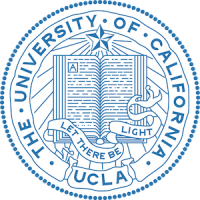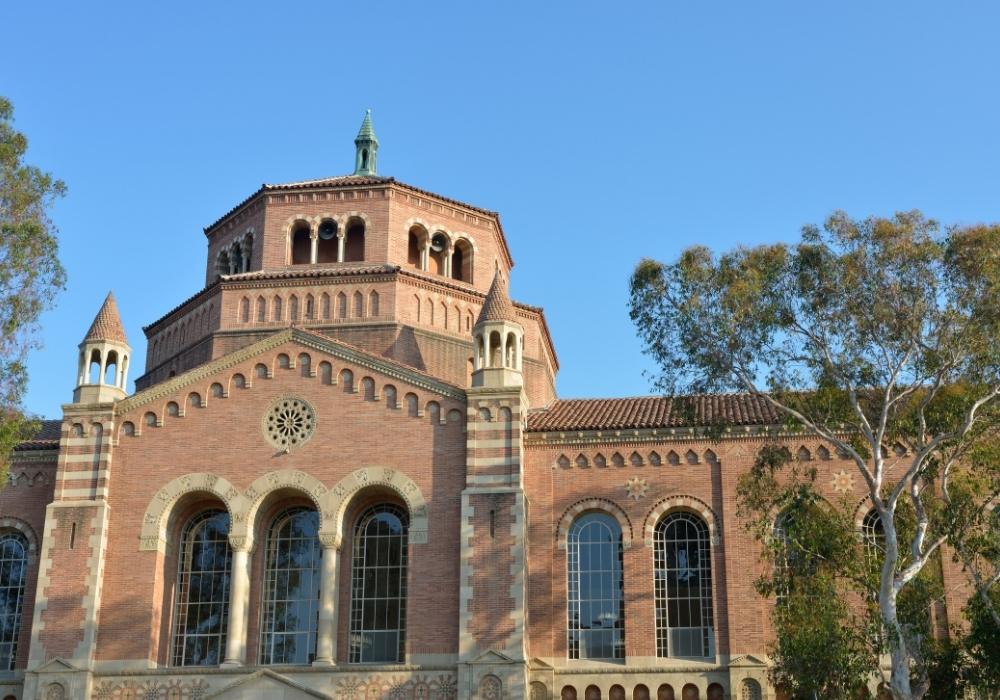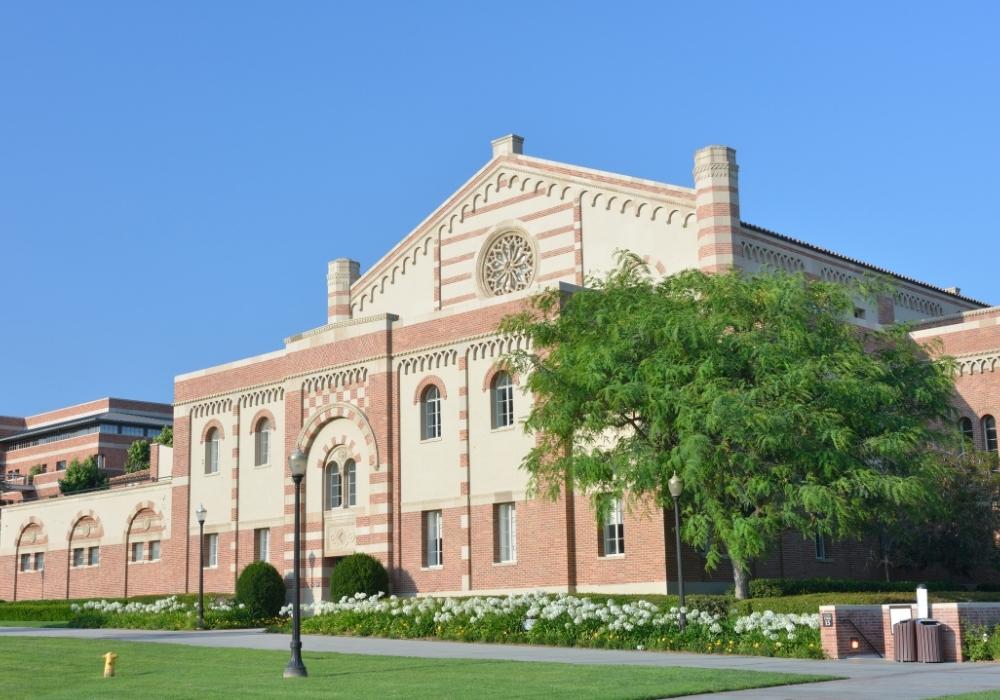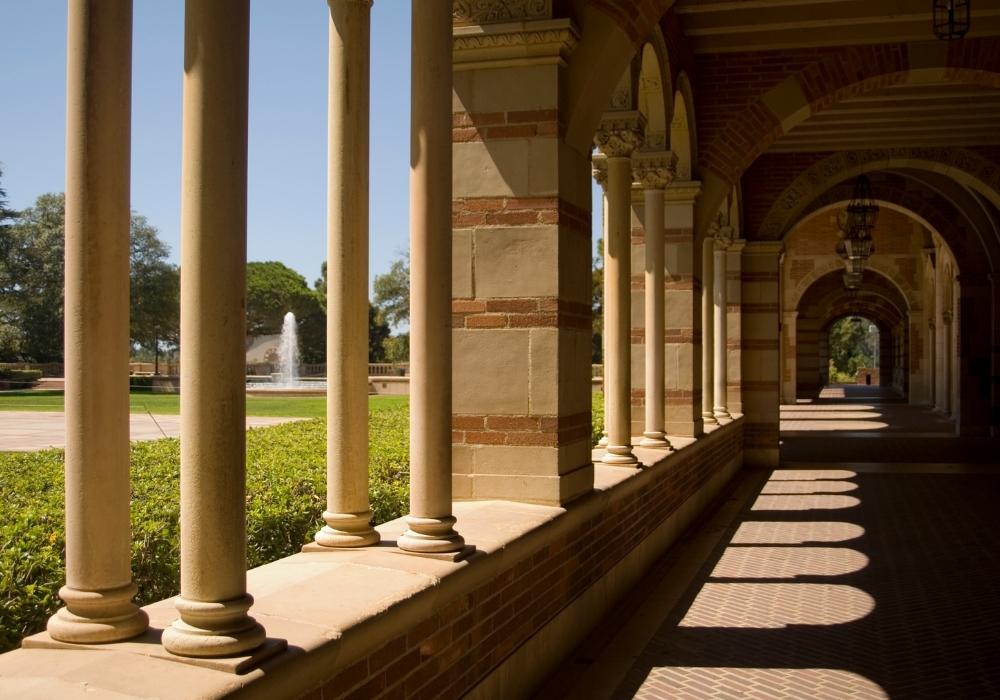The Ivy Scholars guide to UCLA’s culture, admissions, and other essential information for prospective students and their families.
Location: Los Angeles, California
Mascot: Joe Bruin the Bear
Type: Public Research Institution
Population: 46,000 (31,000 undergrads)

Located in the heart of Los Angeles, UCLA’s 419 acre campus is sun drenched. With strong athletics, academics, and more than 1,000 extracurriculars, UCLA offers opportunities to all students. Considered one of the “public ivies,” UCLA is consistently ranked as one of the best public colleges in the nation. With all of Los Angeles to explore, UCLA offers opportunities to investigate anything students are passionate about.

Year Founded: 1919
4 Year Graduation Rate: 74%
Gender Distribution: 57% female, 43% male
Acceptance Rate: 12%
Residency: 85% in state, 5% out of state, 10% international
Location Type: Urban
Schedule System: Quarters
Student/Faculty Ratio: 18:1
Average Class Size: 26
Demographics: 29% Asian, 27% Caucasian, 22% Hispanic, 19% Other or Unknown, 3% Black
US News Rankings:
Independent Rankings:
Application Deadlines:
Notification Dates:
Acceptance Rates:
Average Applicant Pool: 111,000
Average Number of Applicants Accepted: 14,000
Average Number Enrolled: 6,000
Application Systems: Apply California
Average GPA: 3.9 unweighted
*Test blind.
SAT Scores: 25th% – 1280, 75th% – 1510
ACT Scores: 25th% – 27, 75th% – 34
*Test mandatory. Writing sections are not required.
Demonstrated Interest:
UCLA does not consider demonstrated interest.
Recommendation Letter Policies:
Letters of recommendation are not required, and UCLA asks that you not submit them. Some majors or programs may require them, but the standard application does not.
UCLA Essay Prompts:
Special Notes:
Transfer:
Admissions Criteria:
The most important criteria is academic preparation. UCLA recalculates students’ GPAs without their freshman year grades. They also do not count grades from non-academic courses (such as band or gym) when calculating GPA. They do weigh the difficulty of courses, including APs, in their calculation. The average GPA for Letters and Science is 4.2, for Engineering its 4.3. A 3.4 GPA for non-California residents and a 3.0 GPA for residents is required to have the rest of your application considered.
Other factors which are very important are your essays and course rigor.
Factors which are important are: extracurriculars, work experience, volunteering, talent, and character.
Factors which are considered are: first generation status, geographic origin, and state residency.
Being a recruited athlete helps your chances of admission greatly, so long as you meet the academic minimums. Recruited athletes’ average GPAs are far below the general average.
What is UCLA Looking For?
UCLA uses an aggregate points added system to rate candidates, with points being added to the total rating for each category. They look for more well rounded candidates generally, as opposed to the Ivy League, although this does vary some by school. Students must meet academic minimums in order to be considered as candidates as a whole.
Every application which is considered is read at least twice before a decision is made, and many are read more than that. Beyond academic work, they want to see how a student spent their time outside of the classroom, and what their impact was on their school and the broader community they inhabit. They try to determine how the student will benefit and affect the community at UCLA based on their past actions.
Engineering has faculty involvement in the admissions process, and a much higher academic bar. They also like to see research experience and heavy involvement in STEM. Due to attempts to maintain fairly even gender ratios, women have a slightly easier time gaining admission to the school, as there are fewer female applicants overall, and thus a greater percentage is admitted.
Out-of-state students have a slightly higher acceptance rate than in-state students, but this is due to disparate application rates, and it is much harder for out of state students to gain admission generally. International students have a harder time than all domestic students.
UCLA Strategy:
Students applying to a specific major, especially in Engineering, should use one of their essays to discuss how they have already engaged with the major, and why they are interested in it. Evidence of past competence is seen as a marker for future potential.
While all UC schools are forbidden from considering race in college admissions, they do look at socio-economic status, and they want to recruit students who have succeeded academically in spite of hardships they have endured. If you have undergone hardship, you should definitely use the essay question on that topic to address it. This is especially true if hardship you have undergone has affected your academic performance. While it might not completely excuse poor grades, additional context is always helpful.
Leadership is one of the factors the school considers, and as one of the essay topics directly addresses this, if you have leadership experience, you should discuss it here. This is an easy way to add a few points to your application’s total.
Because applications are decided by school (and often by major), your application should reflect why you are a good candidate for the school and major you are applying to. Students applying to study in the sciences in the engineering school should have practical experience, ideally hands-on, in their chosen field. Letters and Sciences also offers many of the same majors, and has an easier acceptance rate, so students who wish to study the sciences but are not as confident about their application should apply there.
Enter your information below and submit for access to the guide.
Schools:
Core Requirements:
Courses of Study:
AP Credit Policies:

Honors Programs:
Research Availability:
Study Abroad:
Business Options:
Pre-Med Options:
Pre-Law Options:
Computer Science Options:
Additional Specialty Programs:
Programs for High Schoolers:

School Motto: Let there be light
Mission and Values:
Residential Housing System:
There are numerous dormitories on campus, clustered in a group known as “The Hill” which hosts more than 10,000 students. Students are guaranteed a room on campus for up to 3 years if they desire it. Students also live in Greek Life associated buildings and in apartments off campus.
Housing Statistics:
Campus & Surrounding Area:
Transportation:
Traditions:
Student-Run Organizations:
Sports:
Greek Life:
Nightlife:

Yearly Cost of Attendance:
Financial Aid:
All students who apply must complete the Free Application for Federal Student AId (FAFSA), to be considered for aid. Most scholarships and aid are based on financial need, although some are merit based. Priority for funding goes to students who submit applications before June 30th each year.
Additional Financial Aid & Student Loan Information
Scholarships:

Ivy Scholars is the leading educational consultant in Sugar Land, Texas, providing admissions coaching, test prep, and more to help students enroll at top tier schools.

Call us now: +1 (281) 215-5148
.
Get expert tips, admissions updates, and resources delivered straight to your inbox.


